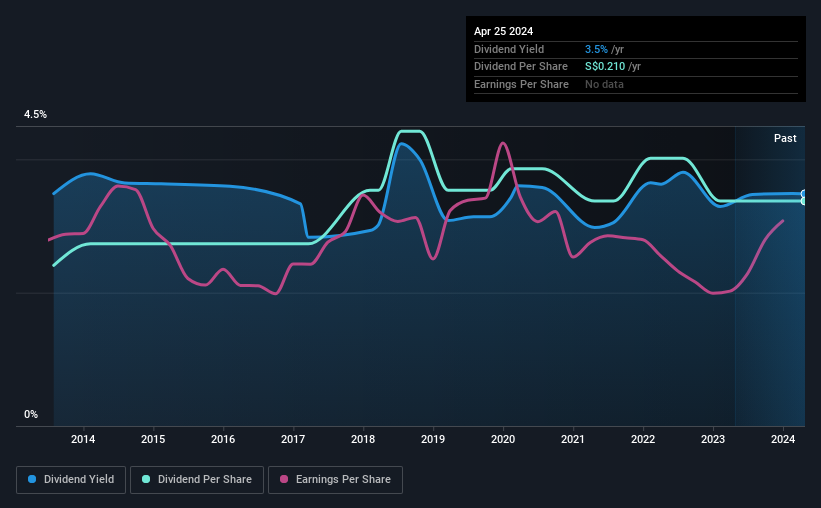United Overseas Insurance (SGX:U13) Has Affirmed Its Dividend Of SGD0.125
United Overseas Insurance Limited (SGX:U13) will pay a dividend of SGD0.125 on the 15th of May. This means that the annual payment will be 3.5% of the current stock price, which is in line with the average for the industry.
Check out our latest analysis for United Overseas Insurance
United Overseas Insurance's Dividend Is Well Covered By Earnings
Unless the payments are sustainable, the dividend yield doesn't mean too much. However, prior to this announcement, United Overseas Insurance's dividend was comfortably covered by both cash flow and earnings. This means that most of what the business earns is being used to help it grow.
Over the next year, EPS could expand by 4.2% if recent trends continue. If the dividend continues along recent trends, we estimate the payout ratio will be 43%, which is in the range that makes us comfortable with the sustainability of the dividend.
Dividend Volatility
The company's dividend history has been marked by instability, with at least one cut in the last 10 years. Since 2014, the annual payment back then was SGD0.15, compared to the most recent full-year payment of SGD0.21. This means that it has been growing its distributions at 3.4% per annum over that time. The dividend has seen some fluctuations in the past, so even though the dividend was raised this year, we should remember that it has been cut in the past.
Dividend Growth May Be Hard To Achieve
Growing earnings per share could be a mitigating factor when considering the past fluctuations in the dividend. However, United Overseas Insurance has only grown its earnings per share at 4.2% per annum over the past five years. While growth may be thin on the ground, United Overseas Insurance could always pay out a higher proportion of earnings to increase shareholder returns.
In Summary
Overall, we think United Overseas Insurance is a solid choice as a dividend stock, even though the dividend wasn't raised this year. The payout ratio looks good, but unfortunately the company's dividend track record isn't stellar. Taking all of this into consideration, the dividend looks viable moving forward, but investors should be mindful that the company has pushed the boundaries of sustainability in the past and may do so again.
It's important to note that companies having a consistent dividend policy will generate greater investor confidence than those having an erratic one. Meanwhile, despite the importance of dividend payments, they are not the only factors our readers should know when assessing a company. To that end, United Overseas Insurance has 2 warning signs (and 1 which is potentially serious) we think you should know about. Is United Overseas Insurance not quite the opportunity you were looking for? Why not check out our selection of top dividend stocks.
Have feedback on this article? Concerned about the content? Get in touch with us directly. Alternatively, email editorial-team (at) simplywallst.com.
This article by Simply Wall St is general in nature. We provide commentary based on historical data and analyst forecasts only using an unbiased methodology and our articles are not intended to be financial advice. It does not constitute a recommendation to buy or sell any stock, and does not take account of your objectives, or your financial situation. We aim to bring you long-term focused analysis driven by fundamental data. Note that our analysis may not factor in the latest price-sensitive company announcements or qualitative material. Simply Wall St has no position in any stocks mentioned.

 Yahoo Finance
Yahoo Finance 
